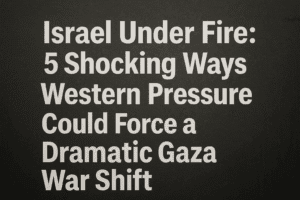Israel Under Fire: 5 Shocking Ways Western Pressure Could Force a Dramatic Gaza War Shift
Israel faces mounting pressure from key allies, including the EU, UK, Canada, and France, over its prolonged military campaign in Gaza, now in its 19th month. The EU’s review of its critical trade and research pact with Israel signals a historic shift, while threats of sanctions and paused trade talks underscore growing frustration with civilian casualties (over 53,000 deaths) and famine-like conditions. Domestically, Israeli society is divided: mass protests demand hostage deals, while Netanyahu’s far-right coalition vows to “conquer” Gaza.
Though the U.S. remains Israel’s staunchest ally, subtle policy shifts—like bypassing Israel in regional negotiations—hint at fraying patience. Critics argue fragmented sanctions lack impact without full arms embargoes, as aid groups warn of genocide risks. With global outrage intensifying and Israel’s global standing at risk, the crisis tests whether diplomatic pressure can outweigh entrenched security imperatives or if Gaza’s humanitarian collapse will deepen regional instability.

Israel Under Fire: 5 Shocking Ways Western Pressure Could Force a Dramatic Gaza War Shift
As Israel’s military campaign in Gaza stretches into its 19th month, unprecedented pressure from its closest Western allies has sparked a pivotal question: Can international diplomacy force a shift in Israel’s strategy, or will domestic politics and security concerns prevail?
A Growing Chorus of Dissent
For decades, Israel enjoyed largely unwavering support from Western nations. But the scale of destruction in Gaza—over 53,000 deaths, widespread starvation, and accusations of potential genocide—has strained alliances. Key developments include:
- EU Scrutiny: The European Union, Israel’s largest trade partner, is reviewing its 25-year Association Agreement, which facilitates economic and scientific cooperation. While termination is unlikely, even a partial suspension could disrupt Israel’s access to EU research funds (like Horizon Europe) and increase trade barriers.
- Sanctions Threats: The UK paused trade talks and sanctioned extremist West Bank settlers, while Canada and France warned of similar measures.
- Humanitarian Outcry: The UN’s humanitarian chief has urged action to prevent genocide, with aid groups documenting catastrophic conditions, including infant deaths from malnutrition.
Domestic Divisions in Israel
Israel’s society is deeply fractured. While Prime Minister Benjamin Netanyahu’s coalition, backed by far-right factions, vows to “conquer” Gaza and displace its population, mass protests demand a ceasefire and hostage deal. A recent Channel 12 poll found 61% of Israelis prioritize hostage releases over continued military action.
Expert Insight:
- Arie Reich (Bar-Ilan University) notes external pressure often backfires, rallying public support around leaders during security crises. However, he acknowledges Israel’s “window for military action is closing” as Western tolerance wanes.
- Hugh Lovatt (ECFR) highlights Europe’s symbolic shift: Merely discussing the Association Agreement review reflects growing “anger” over Gaza, a once-unthinkable stance.
The U.S. Wildcard
The U.S. remains Israel’s most influential ally, but subtle cracks are emerging:
- The Trump administration brokered a Houthi ceasefire in Yemen and negotiated a hostage release with Hamas, bypassing Israeli input.
- Reports suggest the U.S. may no longer insist on Saudi-Israel normalization as a precondition for defense deals.
Despite this, Trump’s “America First” approach prioritizes U.S. interests, leaving Netanyahu navigating uncertain diplomatic terrain. U.S. officials emphasize continued support but signal frustration over Gaza’s humanitarian crisis, warning that images of starvation could erode bipartisan backing in Congress.
Limits of Leverage
While European sanctions and aid restrictions carry symbolic weight, critics argue they lack teeth without a full arms embargo or economic isolation. Omar Barghouti of the BDS movement asserts that partial measures ignore decades of “complicity” in military and diplomatic support. Meanwhile, Israel’s defiance persists:
- Netanyahu dismissed allies’ criticism as rewarding Hamas’ October 7 attacks.
- The military’s recent decision to permit minimal food aid into Gaza—amid global backlash—hints at pragmatism, but falls short of systemic change.
Pathways to Change
- Domestic Pressure: Rising anti-war protests and hostage families’ activism could weaken Netanyahu’s coalition.
- Economic Costs: EU trade disruptions or U.S. aid conditions might sway policymakers, though unanimity hurdles remain.
- Regional Dynamics: Arab states’ refusal to engage in postwar planning without Palestinian statehood talks adds pressure.
The Stakes for Gaza and Beyond
The conflict’s prolongation risks entrenching Israel as a “pariah state,” warns opposition leader Yair Golan. For Gaza, the toll is existential: collapsed healthcare, famine, and generational trauma. Experts warn that without a political resolution, cycles of violence will persist, destabilizing the region.
Conclusion:
Western pressure has introduced new variables into Israel’s calculus, but transformative change hinges on intertwined factors—U.S. resolve, European unity, and Israeli public sentiment. While Netanyahu gambles on unwavering security rhetoric, the specter of isolation and moral accountability may yet alter the trajectory. The world watches whether diplomacy can bridge the chasm between strategic imperatives and humanitarian imperatives.
You must be logged in to post a comment.